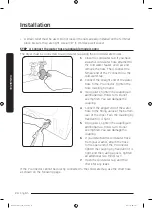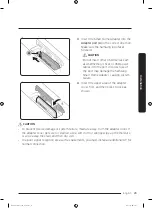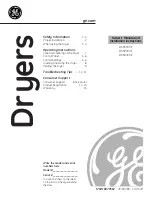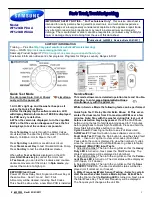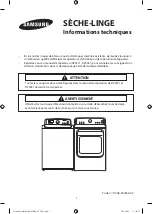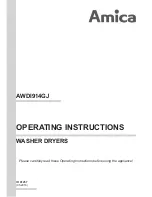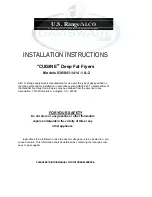
Installation requirements
Installation requirements
English
16
Gas requirements
WARNING
• Use only natural or LP (liquid propane)
gases.
• THE INSTALLATION MUST CONFORM
WITH LOCAL CODES, OR IN THE
ABSENCE OF LOCAL CODES, WITH
THE NATIONAL FUEL GAS CODE ANSI/
Z223.1, LATEST REVISION (FOR THE
UNITED STATES), OR WITH THE CAN /
CGA-B149 INSTALLATION CODES (FOR
CANADA).
• Gas dryers are equipped with a burner
vent for use with natural gas. If you
plan to use your dryer with LP (liquid
propane) gas, it must be converted
for safe and proper performance by a
qualified service technician.
• A 1/2” (1.27 cm) gas supply line is
recommended and must be reduced to
connect to the 3/8” (1 cm) gas line on
your dryer. The National Fuel Gas Code
requires that an accessible, approved
manual gas shut-off valve be installed
within 6” of your dryer.
• Gas dryers installed in residential
garages must be raised 18 inches (46
cm) above the floor.
• Additionally, a 1/8” (0.3 cm) N.P.T.
(National Pipe Thread) plugged tapping,
accessible for test gauge connection,
must be installed immediately upstream
of your dryer’s gas supply connection.
• Your dryer must be disconnected from
the gas supply pipe system during any
pressure testing of the system.
• Do not reuse old flexible metal gas
lines. Flexible gas lines must be
design certified by the American Gas
Association (CGA in Canada).
NOTE
• Your dryer uses an automatic ignition
system to ignite the burner. There is no
constant burning pilot.
• Any pipe joint compound used must be
resistant to the action of any liquefied
petroleum gas.
• As a courtesy, most local gas utilities
will inspect a gas appliance installation.
Commonwealth of Massachusetts
installation instructions
Your dryer must be installed by a licensed
plumber or gas fitter. A “T” handle manual
gas valve must be installed in the gas
supply line to your dryer. If a flexible gas
connector is used to install your dryer, the
connector can be no longer than 3’ (36”).
WARNING
• Gas leaks may occur in your system,
creating a dangerous situation.
• Gas leaks may not be detected by smell
alone.
• Gas suppliers recommend you purchase
and install a UL-approved gas detector.
• Install and use in accordance with the
manufacturer’s instructions.
DV7500K-03381C-00_EN_160218.indd 16
2016-02-18 1:19:29























